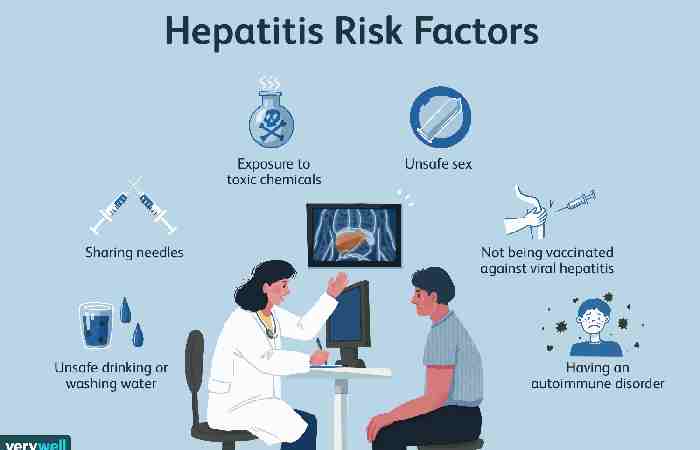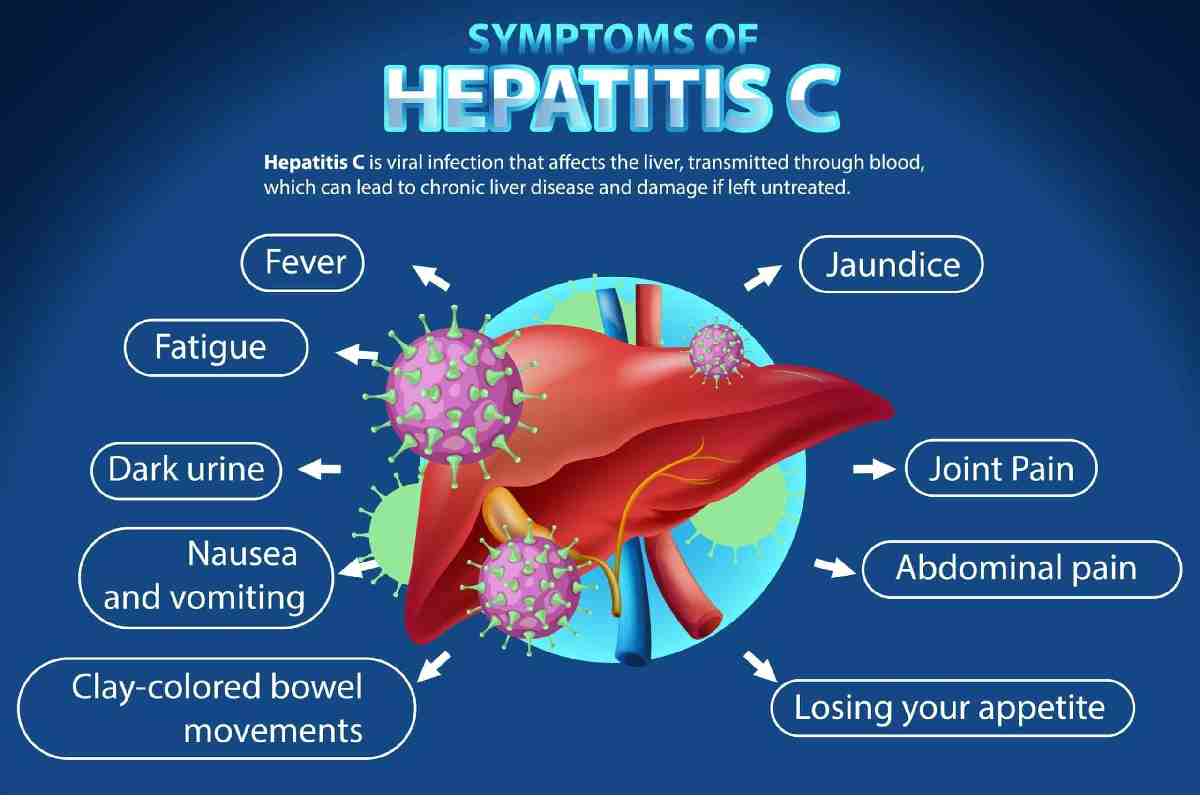Hepatitis c symptoms- Hepatitis C Symptoms are an infectious liver sickness that can prompt cirrhosis, liver disappointment, and liver disease. Albeit early analysis can forestall liver harm, hepatitis C can be deadly whenever left untreated.
The hepatitis C infection (HCV) causes hepatitis C. It attacks liver cells, causing aggravation, enlarging, brokenness, and inevitable organ harm.
Table of Contents
Symptoms of Diseases
Hepatitis C can go from a mild disease enduring half a month to a severe and ongoing medical issue.
Individuals can have hepatitis C without any side effects, particularly at the intense stage, and may not realize they have. In addition, it makes it simpler to communicate with other people.
Intense hepatitis C symptoms
The vast majority with intense hepatitis C don’t foster side effects. However, on the off chance that they do, side effects typically emerge between 2 and 12 weeks of trusted Source after openness.
Individuals seldom get a finding of intense hepatitis C as it needs authoritative side effects. Along these lines, specialists frequently call hepatitis C the quiet scourge.
The intense side effects are the same as other viral contaminations. Side effects of extreme hepatitis C include:
- a fever
- fatigue
- abdominal pain
- loss of appetite
- nausea or vomiting
- dark urine
- clay-coloured stool
- joint pain
- jaundice, rarely
However, As specified by the CDC, close to half rusted Source of individuals with intense hepatitis C clear the infection from bodies without therapy and don’t temporary the persistent condition; scientists don’t know why this happens to specific individuals and not others.
Persistent hepatitis C
Hepatitis C becomes persistent when the body can’t clear the infection. By and large, ongoing hepatitis C causes no side effects or causes general side effects, like constant weariness or
wretchedness. An individual may figure out they have the condition during a normal blood test or evaluation for a blood gift.
Early determination and treatment can forestall liver harm. Left untreated, persistent hepatitis C can prompt:
- CHRONIC liver sickness, which can happen gradually north of quite a few years with next to no side effects
- cirrhosis, or liver scarring
- liver disappointment
- liver malignant growth
Causes and risk factors of hepatitis C symptoms

HCV causes hepatitis C. Individuals contract the infection through blood-to-blood contact with sullied blood. For transmission to happen, blood containing HCV should enter an individual’s body without HCV.
A bit of blood, invisible to the unaided eye, can convey many hepatitis C infection particles, and the infection isn’t difficult to kill.
The CDC Trusted Source reports the accompanying gamble factors for creating hepatitis C:
- utilizing or having utilized injectable medications, the most widely recognized course in the U.S.
- getting bondings or organ transfers before 1992, which is before blood screening opened up
- having an openness to a needle stick, which is most regular in individuals who work in medical services
- being brought into the world to a mother who has hepatitis C
The CDC offers counsel by Trusted Source on cleaning needles on the off chance that utilizing spotless and sterile ones is preposterous. Although detergent can kill HCV in hands, it might not affect other gear. Bubbling, consuming and using liquor, peroxide, or other normal cleaning liquids to wash hardware can decrease the amount of HCV. Yet, it probably won’t prevent an individual from getting the disease.
An individual can’t get the infection from easygoing contact, breathing, kissing, or sharing food. There is no proof that mosquito chomps can move the disease. The gamble is low. However, individuals can likewise contract hepatitis C by:
- sharing things that could have contact with blood, like toothbrushes or razors
- having intrusive medical care methodology, like infusions
- getting a tattoo from an unregulated supplier
Because of these variables, persons in danger can have screening to preclude HCV.
Is it curable, and Is it contagious?
Yes. Present-day medicines can fix hepatitis C, as a rule. These medicines include a blend of antiviral meds taken for 8-24 weeks Trusted Source. In any case, as many individuals with HCV don’t realize they are contaminated, they may not look for testing and treatment for a long time.
Yes, hepatitis C is infectious. People become tainted with HCV through blood-to-blood contact with contaminated blood.
Treatment
Direct-acting antiviral drugs (DAAs) can fix most instances of ongoing hepatitis C and intense hepatitis C. These are present-day prescriptions that the specialists supported in 2013. But unfortunately, the vast majority endure the medications, with the most widely recognized incidental effects being cerebral pain and weariness.
These drugs work by focusing on straightforward strides in the HCV life cycle to disturb the multiplication of viral cells.
DAAs to treat hepatitis C include:
- elbasvir/grazoprevir (Zepatier)
- glecaprevir and pibrentasvir (Mavyret)
- ledipasvir/sofosbuvir (Harvoni)
- peginterferon alfa-2a (Pegasys)
- sofosbuvir (Sovaldi)
Before DAAs opened up, the therapy for persistent hepatitis C was extended and awkward, with not great fix rates. Today, fix rates are over 90%Trusted Source.
Notwithstanding, new drugs can be excessive. Most government and personal health care coverage physician-recommended drug plans will assist with giving an inclusion to these meds. Some medication organizations and different projects can help, as well.
Talk with medical services proficient for exhortation on paying for hepatitis C therapy.
Diagnosis and tests
Specialists can analyze hepatitis C utilizing blood tests:
To start with, the specialist plays out a straightforward blood test to search for hepatitis C antibodies in the blood. A positive test implies that the individual has had an openness to the infection. However, it doesn’t be guaranteed to demonstrate progressing disease.
If the immune response test is positive, the individual might have a subsequent blood test called a hepatitis C RNA test. It will check whether the infection is as yet present in the blood.
A third blood test, called a genotype test, can determine the kind of hepatitis C infection available.
CONCLUSION
In Article that the individual has had hepatitis C for quite a while, a specialist might prescribe further tests to search for liver harm, measure the seriousness of any current injury, and preclude different reasons for damage.
These tests, for the most part, include blood tests and ultrasound checks. In addition, specialists utilize a liver biopsy to take a little example of liver tissue when different tests don’t give sufficient data.
Also Read
Wellhealthorganic.com : Remove Dark Spots On Face Tang – Lemon Juice

